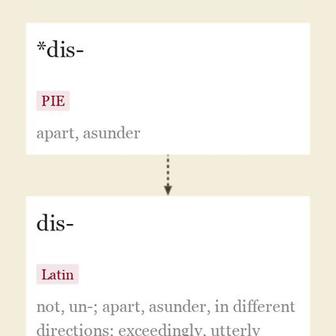disparity (n.)
1550s, "state or character of being essentially different;" 1590s, "quality of being unequal in rank, condition, etc.;" from French disparité (16c.), from Medieval Latin disparitatem (nominative disparitas) "inequality," from dis- "not" (see dis-) + paritas "parity," from Latin adjective par (genitive paris) "equal" (see par (n.)). Related: Disparities.
Entries linking to disparity
1620s, "equality in value or circumstances," also "value of one currency in terms of another," from Latin par "equal, equal-sized, well-matched," also as a noun, "that which is equal, equality," a word of unknown and disputed origin. De Vaan is noncommittal. Watkins suggests perhaps from PIE root *pere- (2) "to grant, allot," with suggestion of reciprocality. Another guess connects it with PIE root *per- (5) "to traffic in, sell" (on notion of "give equal value for"). Meaning "a standard fixed by consent or by natural conditions, average or usual amount" is first attested 1767. Golf sense is attested by 1898, which led to the figurative use of par for the course for "fairly normal, what can be expected" (by 1928).
word-forming element of Latin origin meaning 1. "lack of, not" (as in dishonest); 2. "opposite of, do the opposite of" (as in disallow); 3. "apart, away" (as in discard), from Old French des- or directly from Latin dis- "apart, asunder, in a different direction, between," figuratively "not, un-," also "exceedingly, utterly." Assimilated as dif- before -f- and to di- before most voiced consonants.
The Latin prefix is from PIE *dis- "apart, asunder" (source also of Old English te-, Old Saxon ti-, Old High German ze-, German zer-). The PIE root is a secondary form of *dwis- and thus is related to Latin bis "twice" (originally *dvis) and to duo, on notion of "two ways, in twain" (hence "apart, asunder").
In classical Latin, dis- paralleled de- and had much the same meaning, but in Late Latin dis- came to be the favored form and this passed into Old French as des-, the form used for compound words formed in Old French, where it increasingly had a privative sense ("not"). In English, many of these words eventually were altered back to dis-, while in French many have been altered back to de-. The usual confusion prevails.
As a living prefix in English, it reverses or negatives what it is affixed to. Sometimes, as in Italian, it is reduced to s- (as in spend, splay, sport, sdain for disdain, and the surnames Spencer and Spence).
Trends of disparity
More to Explore
updated on December 08, 2020
Trending words
Dictionary entries near disparity
disown
disownment
disparage
disparagement
disparate
disparity
dispassionate
dispatch
dispatcher
dispel
dispensable

